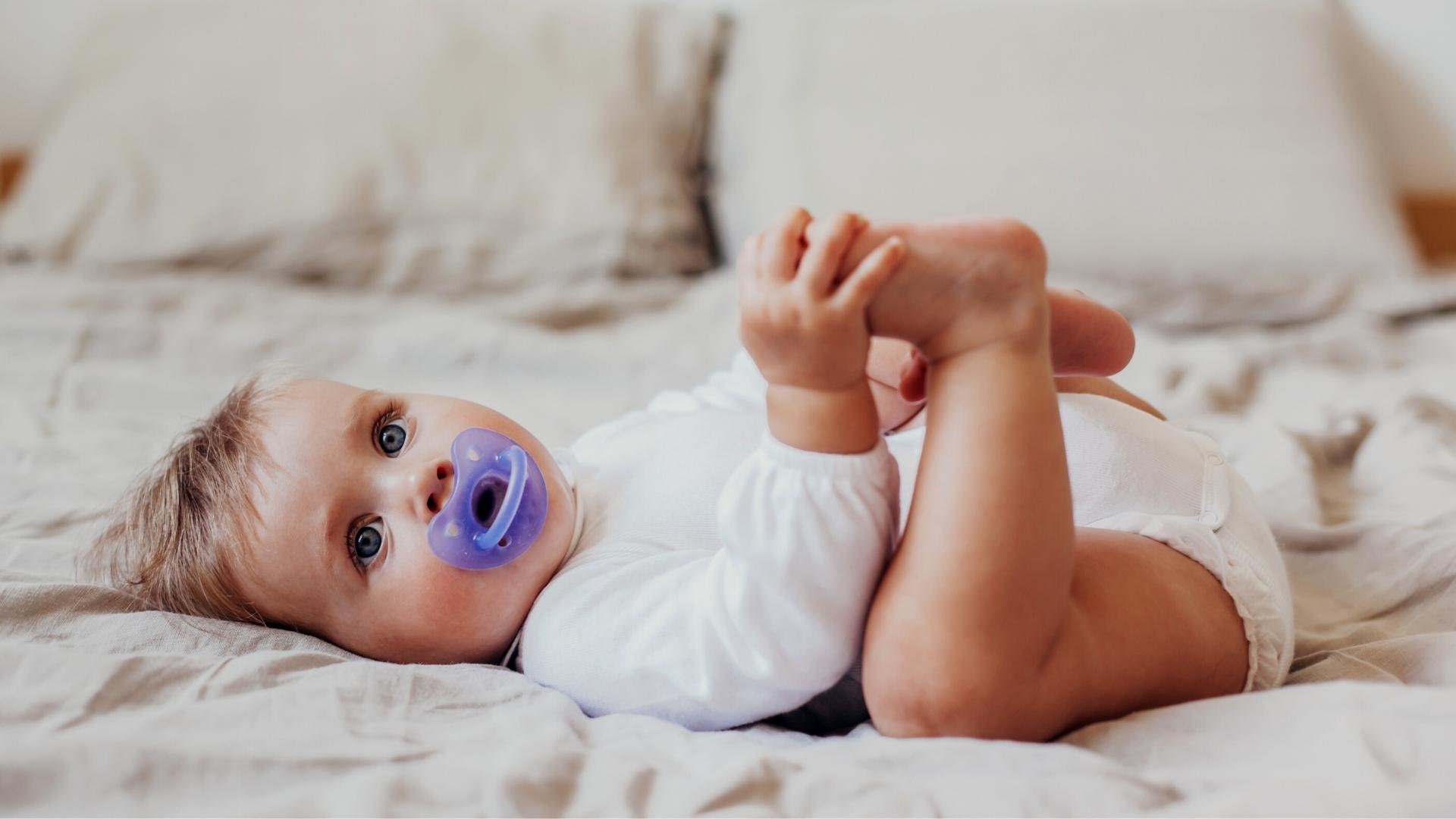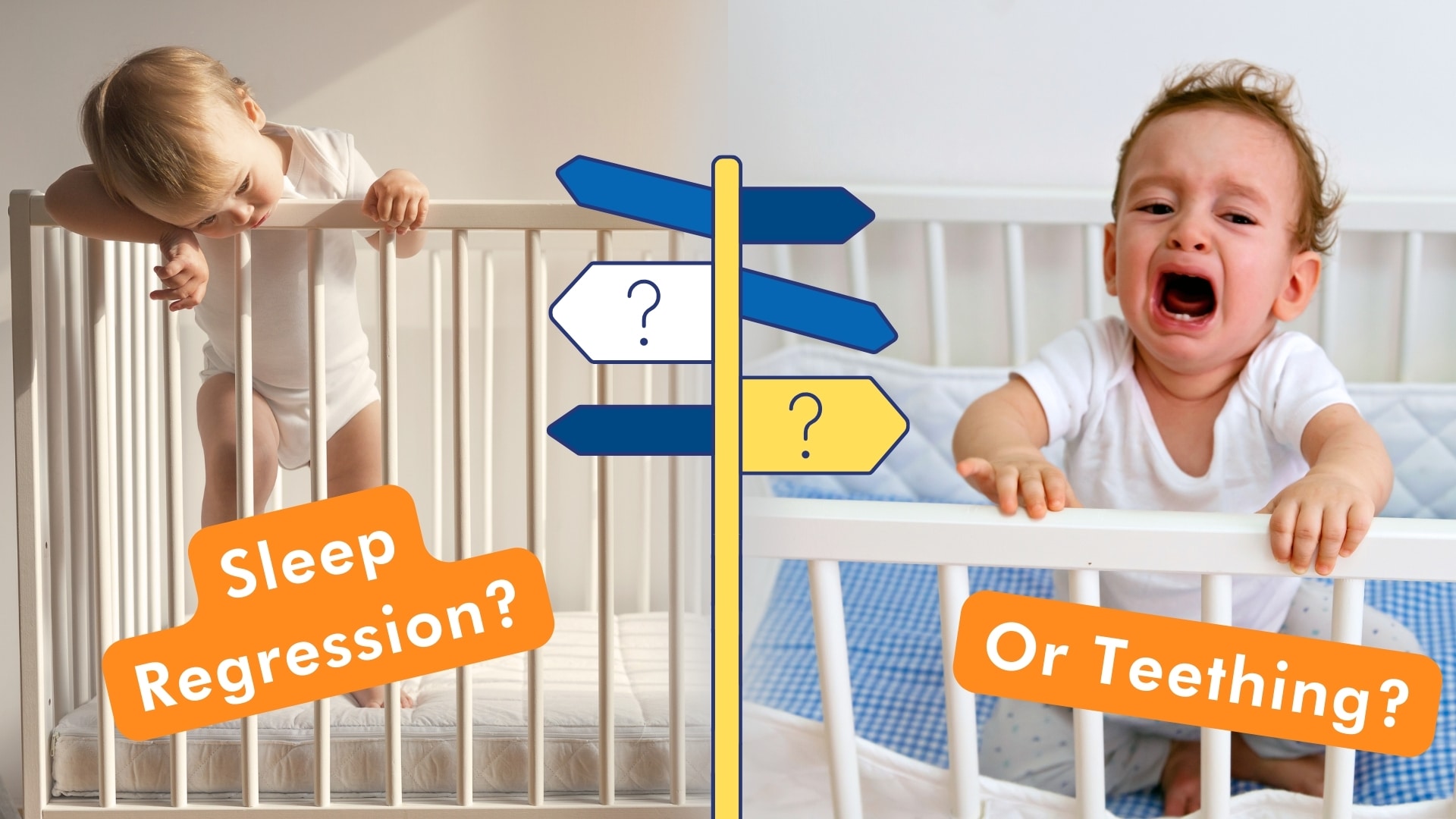Baby suddenly fighting sleep? Being fussy? Struggling to settle? The 11 month sleep regression has arrived. Here’s what that means, and what exhausted parents need to know to get through it.
What Is The 11 Month Sleep Regression?
The 11 month sleep regression is a short period of time in which your baby’s sleep pattern becomes disrupted by them fighting sleep between 10-12 months of age, waking more often and struggling to fall back to sleep, usually as a result of developmental leaps.
How Long Does The 11 Month Sleep Regression Last?
The 11 month sleep regression, like all sleep regressions, commonly lasts between 2 and 6 weeks depending on the trigger.
Causes Of The 11 Month Sleep Regression
There is not always one clear reason why your baby may be experiencing a sleep regression but at 11 months old there is a lot going on in your baby’s world that can cause sleep disruption.
Check out these causes of the 11 month sleep regression and see if you can identify any that may have occurred in your baby’s life recently:
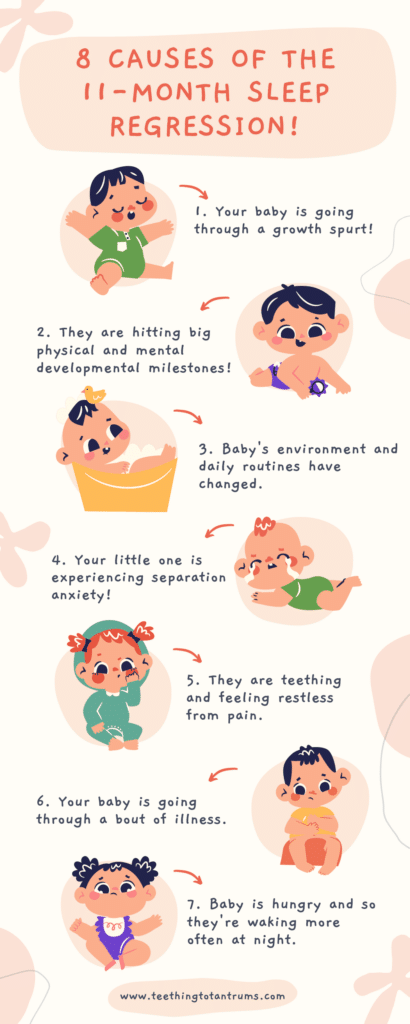
- Your baby is having a growth spurt! All that extra energy needed to grow can easily disrupt a well-established sleep pattern.
- They are reaching big physical, mental and emotional developmental milestones. A lot is going on developmentally at this age with your little one perfecting the art of crawling, pulling to stand and cruising around furniture. There is a lot going on cognitively as well as they become increasingly aware of the world around them and their place in it. They are also starting to use words to communicate. All that extra brain and body activity can easily disrupt their sleep!
- You have changed baby’s environment and daily routine. Moving house, going on holiday or visiting family overnight can all trigger a sleep regression. Essentially, any major changes in routine could also upset an established sleep schedule such as starting daycare, parents returning to work or the primary caregiver changing too.
- Your baby is experiencing separation anxiety. Separation anxiety is also very common at this age and will make it difficult for your baby to fall asleep. Also, they may become distressed when they wake up at night and discover you’re not with them.
- They’re teething! While most babies will have passed the teething phase by now some will still be getting theirs. If your little one is experiencing pain due to teething their sleep is very likely to be disrupted for a short while and although this is not a true sleep regression in itself, it may trigger one. Investing in a natural teething toy can help soothe your baby resulting in helping them sleep better!
- Your baby is unwell. Like teething, illness may cause a sleep disruption for a short period of time and although this is not a true sleep regression, sickness can trigger a brief one.
- Baby is hungry. With all the increased physical activity that your 11 month old is now capable of they may need more calories to keep them going. This can result in them waking more often due to hunger so you need to keep an eye on their calorie intake during the day and especially at the end of the day.
How Much Sleep Do 11 Month Olds Need?
Your 11 month old will need between 11-14 hours of sleep in a 24-hour period with 10-12 hours taken at night and the rest in 2 daytime naps.
11 Month Sleep Regression Signs
The signs to identify whether your baby is going through an 11 month sleep regression or not are:
- Baby has difficulty falling asleep. If your baby has been falling asleep nicely and then starts to regress to resisting sleep and struggling to settle then it is very likely they have hit a sleep regression.
- Your baby is crying more and becoming agitated when they wake. Because a sleep regression results in less deep refreshing sleep your little one may wake in a grumpy mood and be rather fussy and unsettled.
- They wake more often at night and struggle to get back to sleep. As with finding it more difficult to fall asleep, it is typical during a sleep regression due to the change in their sleep pattern for your baby to wake more often at night. This may also affect how long they stay asleep during the day.
- Your baby is learning new skills. If your baby is starting to pull to stand, cruise around furniture or maybe even take a step or two… they will be stimulating their brain and body to the point that they find it difficult to unwind at naptime and bedtime. You may even find that they are waking, pulling themselves to stand or crawling into corners and unable to lie down and get comfortable again.
- Your baby is more alert and interested in their surroundings. As with learning a new skill, developing an interest in their surroundings means your little one’s brain is being very stimulated and may struggle to wind down for sleep
- Your baby fights sleep despite being tired. During a sleep regression, it is easy for your little one to become overtired and this can result in them fighting sleep. In addition, when learning new skills the extra stimulation can make it difficult for them to turn off and wind down in order to sleep.
- They are more clingy. By 11 months of age, your baby will definitely be more aware of their surroundings and more attached to those that care for them. This can result in them being more clingy and not liking being left alone especially when it is time to sleep.
Tips To Get Through The 11 Month Sleep Regression
As someone who has worked with numerous families over the years, I have developed and tested various techniques to help parents and babies navigate through sleep regressions as smoothly and efficiently as possible.
However, I must be honest with you… the 10-12 month sleep regression can be a real challenge.
I understand that you’re likely feeling incredibly exhausted and overwhelmed, and the thought of losing even more sleep is probably unbearable.
Nonetheless, it’s important to remain committed to your established routines and strategies.
By persevering through this difficult period, your baby will return to their previous sleep patterns much faster, and you’ll avoid having to undo any negative sleep habits in the future.
Remember, short-term discomfort can lead to long-term benefits.
So, without further ado, let’s explore my top tips for surviving the 11 month sleep regression:
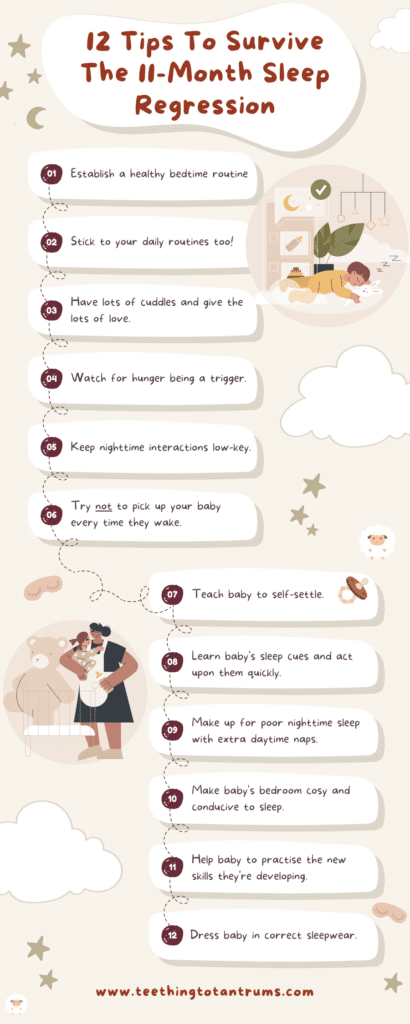
1. Establish A Healthy Bedtime And Nap Routine
If you have not established a consistent bedtime routine now is 100% the time to do so.
The benefits of a bedtime routine and having healthy sleep habits will make it easier for you to cope when your baby decides to fight sleep.
And making it clear to your little one that the end of the day is coming by lowering the energy levels and getting into a cosy bedroom will give them all the right signals that bedtime is on the way.
2. Stick To Your Daily Routines
I cannot stress how much maintaining baby’s healthy daily and bedtime routines will help to keep you sane and keep their healthy development on track.
I know life gets in the way sometimes, but being super vigilant about nap times, meal times and bedtimes during an 11 month sleep regression will make your life so much easier during this time.
So, if you have to cancel a few plans over the coming weeks to ensure you’re at home for naps and bedtime, it will be worth it in the long run.
3. Have Lots Of Cuddles
At the 11-month mark, sleep regressions can sometimes make your little one feel insecure and offering extra cuddles and snuggle time will help comfort them as they navigate this tricky phase.
4. Watch For Hunger Being Nighttime Waking Trigger
It is very tempting to feed your baby in order to get them back to sleep… however, this is not a habit you want to continue.
Therefore, if your baby is experiencing a growth spurt, ensure they are getting enough solid food during the day to support any growth spurt.
Offering mid-morning and mid-afternoon snacks can help as well as a milky drink before bed will help.
5. Keep Nighttime Interactions Low-Key
If your little one wakes at night then it’s super important to keep your interactions calm and low-key. Have the lights down low (or don’t turn them on) and do not chat to them.
A night light is a great investment for these nighttime interactions as it stops you from having to turn on a light when visiting them at night.
Finding the right night light for your child can be quite a task. You want something safe, comforting, and practical. The Cozy Starry Night Light ticks these boxes, with eye-friendly warm lighting and an easy-to-use dimmer.
Its gentle glow makes it the best night light for feeding baby, diaper changes, or comforting your little one back to sleep.
As your baby grows the Cozy Starry Night Light's starry sky projection can provide comfort and gentle quiet time stimulation. Its soft lighting ensures a dreamy, peaceful environment, supporting your baby’s natural sleep cycle.
It really is a fantastic nightlight (at a very reasonable price!)
- Eye-friendly warm lighting with adjustable brightness.
- Includes a timer function for convenience.
- Projects a starry sky that is soothing for little ones.
- Rechargeable battery, so it's very portable.
- A USB adapter is not included for charging.
- The star projector is static without motion (however, this is ideal for very young babies and toddlers).
- Battery life varies based on the brightness settings.
6. Try Not To Pick Up Your Baby Every Time They Wake
If your little one is waking more at night, try leaving them to fuss for a short time when they wake as it can result in them falling back to sleep without you having to go to them.
If, however, they start to become distressed, you should go to them.
7. Teach Your Baby To Self-Settle
If you have not done so already try and teach your baby to self settle. Allow them to spend time in their cribs while they are awake and put them down whilst drowsy and not asleep.
This will also help baby to build strong sleep associations as they grow. Here’s a handy video to get you started:
8. Learn Your Baby’s Sleep Cues And Act On Them
During a sleep regression your baby may need more sleep during the day to make up for broken nights so keep a keen eye on their sleep cues and act on them.
Increased physical activity and ability can make your little one more tired than usual for a while. As they adjust to their new skills you will need to keep a close eye on sleep cues to avoid them becoming overtired.
9. Make Up For Poor Nighttime Sleep With Extra Naps During The Day
Let your baby sleep whenever they need to during the day to avoid them becoming overtired.
Knowing how much sleep your baby needs in a 24-hour period (about 14 hours) and then creating a nap schedule to calculate how much daytime sleep they need will help enormously too.
REMEMBER: Never try and keep your little one awake during the day in the hope they will sleep better at night.
10. Make Baby’s Sleep Space More Conducive To Sleep
Now your baby is older they will be more easily woken by sleep disturbances and noise. So, darken the bedroom using blackout curtains and use a nightlight as during an 11 month sleep regression your little one needs to be sleeping in a calm, dimly lit room.
Using a white noise machine can eliminate background noise from disturbing your baby’s sleep too. They will help to ensure that sudden changes in noise will have less of an impact on your sleeping baby.
White noise machines are a game-changer for your little one's sleep and having one that plays all night is a must. With a long-lasting battery, this compact and stylish white noise machine contains 21 non-stop relaxing noises, which will lull your little one to sleep night after night, no matter where you are!
11. Help Your Baby Practice New Skills
During the day help your little one learn how to get down from standing so that if they pull to stand in their crib they are able to lie down again and go back to sleep.
If your little one is trying to walk, offer them time using toys they can stand and push along, such as this:
Another toy staple is the baby walker and there are a lot out there to choose from. I really like this one from Le Toy Van. It is eco friendly, safe and sturdy and will be a firm favourite with your toddler before, during and after they learn to walk independently!
NOTE: It is important that you give your baby plenty of opportunity to practice any new skills during wake times so that they are not desperate to do so when they should be sleeping.
12. Dress Your Baby In The Correct Sleep Gear
Ensure your baby is dressed appropriately for the time of year so they are not too hot or too cold. I find sleep sacks or sleeping bags like these are the best for this age group combined with the GroEgg room thermometer.
Another great sleepwear range with sleeping bags to suit all ages and seasons. The easy to follow tog guide used in conjunction with the GroEgg room thermometer will give you peace of mind that you have chosen the perfect sleep attire for your little one.
Offering peace of mind at a glance, the wonderful GRO-Egg changes colour with the temperature of a room. A yellow glow means a safer temperature for children to sleep in which also doubles up as a gentle nightlight for your baby!
How Will I Know When The 11 Month Sleep Regression Is Over?
When your 11 month old starts to settle back into a regular sleep routine of waking less at night, falling asleep independently and quickly and napping consistently during the day you can start to relax as this should signify that the sleep regression has passed.
You will probably also notice that they have perfected any new skill they were learning too.
Take a look at our 11 month old sleep schedule to give you a helpful framework for what to expect.
Looking to get your little one to sleep quickly and effortlessly? Check out my Bedtime and Nap Cheat Sheet and master the art of making daytime naps and bedtimes as seamless as possible.
A bedtime & nap cheat sheet so good your little one will ask you to put them to bed...
Laura Williams "This is a life saver! I'm so glad I downloaded your bedtime & nap cheat sheet. My little one actually asked me to put him to bed last night! Unbelievable! Thank you so much!"
Click Here For The FREE Cheat Sheet
Frequently Asked Questions About The 11 Month Sleep Regression
Looking for more information about the 11 month sleep regression? Check out the most commonly asked questions here.
Is My Baby Really Going Through An 11 Month Sleep Regression?
If your 11 month old has been sleeping well at night and napping nicely during the day and suddenly none of this is happening any more… then you can safely assume that they are experiencing a sleep regression due to any of the reasons listed above.
Being able to identify why your little one is experiencing the 11 month sleep regression will help you get through this phase.
Is An 11 Month Old Nap Regression Related To A Sleep Regression?
In short… Yes, a nap regression at this age is usually related to a sleep regression.
In some cases, naps are affected more than nighttime sleep, but lack of daytime sleep will more often than not impact nighttime sleep, so the two go hand in hand.
The main issue with naps during a regression is that your little one is all fired up to practice new skills both physically and cognitively that they have trouble switching off to sleep, resulting in them fighting sleep and becoming grumpy and fussy due to getting overtired.
Do All Babies Experience An 11 Month Sleep Regression?
No, not all babies will experience an 11 month sleep regression. They may or may not have already had one but sleep regressions are more common at certain ages but can occur at any stage in your little one’s development.
Is The 11 Month Sleep Regression The Worst?
All sleep regressions are tricky and trying and any one of them can be worse than another.
There is no way to predict which regression will be the worst and a lot will depend on the cause of the regression and how it is handled along with the personality of your little one.
Are the 11 Month Sleep Regression And 12 Month Sleep Regression The Same?
It is unlikely that your little one will experience a sleep regression at both 11 and 12 months so in essence… they are the same.
Young children develop in a common sequence but not at a common rate, with babies reaching developmental milestones at different times, especially in the early years.
Therefore if and when your little one experiences a sleep regression will depend totally on what is going on developmentally and environmentally in their lives, at any given point.
Why Is My 11 Month Old Suddenly Not Sleeping?
If your 11 month old has been sleeping beautifully and suddenly starts waking at night and resisting sleep in general… this usually means they have hit a sleep regression.
This can be due to a number of triggers including a growth spurt, teething or achieving a developmental milestone.
While you should always rule out any illness that may be affecting your little one if all is well then you should deal with your little one’s nighttime waking as a sleep regression and follow the tips listed above.
When Do I Need To Talk To A Doctor About The 11 Month Sleep Regression?
If you are unsure if your baby’s change in sleep patterns is due to a sleep regression, watch for the following signs. If they are present then you should consult a doctor:
- Your baby has abnormal breathing or is snoring during sleep
- Your baby is not gaining weight.
- Your baby is eating less.
- Your baby’s urination or bowel movements have changed
- General lethargy or weakness
TOP TIP: You know your baby better than anyone else so if you are concerned that your baby’s sleep issues are more than just a regression, then seek medical advice and have a chat with a sleep consultant or your medical practitioner or paediatrician.
Can You Do Sleep Training When Your Baby Is Going Through An 11 Month Sleep Regression?
I would NOT recommend doing any sleep training during an 11-month-old sleep regression unless the regression transfers into a permanent change in sleeping habits.
There is too much going on to change more of your baby’s environment, so just follow the tips I have outlined above and you should get through the regression without undoing your hard work of creating healthy sleep habits.
Once you’re back on track you can start to assess sleep time and use sleep training methods to help baby sleep at night with healthy sleep associations.
How To Handle Minor Sleep Regressions That Come With Teething
Your baby may be experiencing a minor 11 month sleep regression due to teething. This interruption to their normal sleep pattern should last no longer than 8 days in total.
Read these posts to help you get through a teething blip without losing any sleep:
- Teething: The Complete Guide
- Best Teething Toys of 2022
- 20 Teething Foods To Soothe Baby’s Pain
- Teething Rash: Causes, Symptoms, Pictures & Treatments
Further Reading
If you would like to learn more about sleep regressions and how to handle them at different ages, check out these posts:
- Sleep Regression: What, Why, Signs & Sanity-Saving Solutions
- 4-Month Sleep Regression
- 6-Month Sleep Regression
- 8-Month Sleep Regression
- 12-Month Sleep Regression
- 18-Month Sleep Regression
- 2-Year Sleep Regression
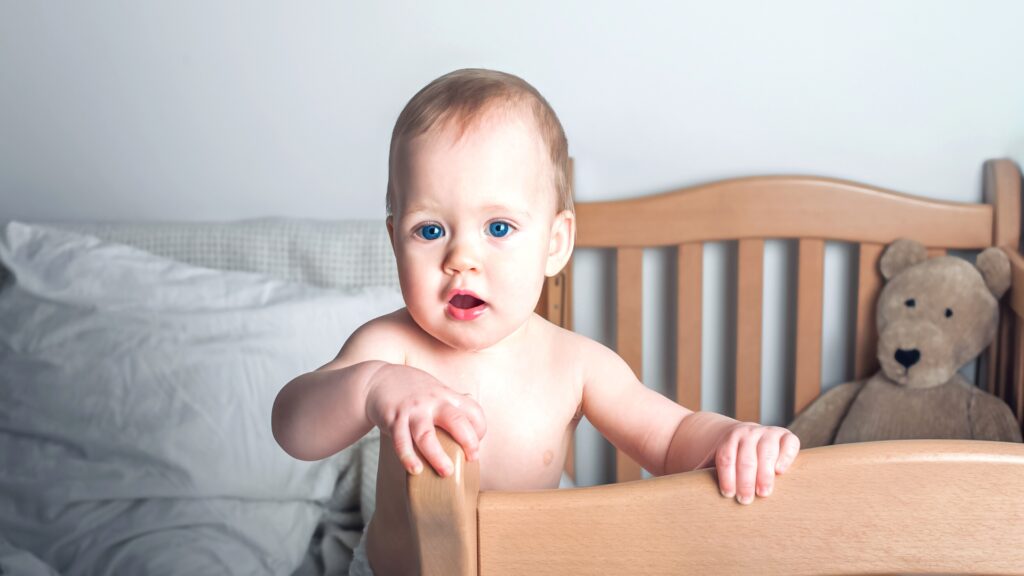
Need More Parenting Help?
- Download our FREE Bedtime & Nap Sleep Cheat Sheet. It’s a free, easy-to-use and proven formula designed for parents of 0-5 year olds to master the art of consistently undisturbed and restful sleep without the yelling, nagging or exhausting long-winded evenings.
- Check out our Parenting Toolbox. You’ll get access to expertly-chosen products that you can guarantee are the best for your little one and your wallet.
- Are you looking for personalized guidance to navigate the challenges of parenting? I offer 1-on-1 consultations to bring you tailored strategies and actionable advice to help support your child's growth and well-being with confidence.

A bedtime & nap cheat sheet so good your little one will ask you to put them to bed...
Laura Williams "This is a life saver! I'm so glad I downloaded your bedtime & nap cheat sheet. My little one actually asked me to put him to bed last night! Unbelievable! Thank you so much!"
Click Here For The FREE Cheat Sheet






